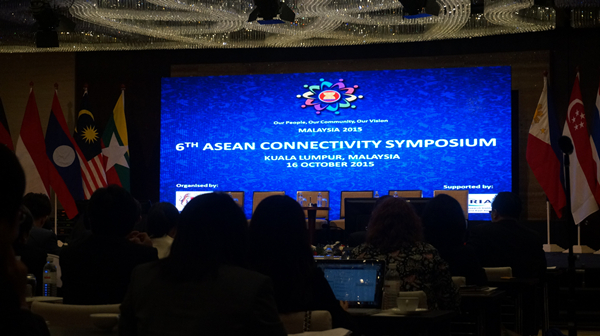On 16 October 2015, the 6th ASEAN Connectivity Symposium, with the theme of “The Connectivity Agenda for an Integrated ASEAN Community”, was held in Kuala Lumpur, Malaysia. The Symposium was organized by the Ministry of Foreign Affairs of Malaysia and supported by the Economic Research Institute for ASEAN and East Asia (ERIA). ASEAN-China Centre (ACC) Secretary-General H.E. Mme. Yang Xiuping was invited to attend the Symposium along with more than 150 Ambassadors and participants from the Committee of Permanent Representatives (CPR) to ASEAN, ASEAN Connectivity Coordination Committee (ACCC), the relevant ministries of ASEAN countries, Asian Development Bank (ADB), World Bank (WB), as well as academic and business circles. Secretary-General of ASEAN-Korea Centre (AKC) H.E. Mr. Kim Young-sun was also invited to attend the Symposium.

Honorable Dato’ Sri Reezal Merican Naina Merican, Deputy Minister of Foreign Affairs of Malaysia, expressed in his address that the Master Plan on ASEAN Connectivity (MPAC) was adopted in 2010 with an aim to promote physical, institutional and people-to-people connectivity. ASEAN economy had maintained growth momentum. Connectivity would further promote trade and attract investment, realize the free flow of personnel, goods and services, enhance the development of Small and Medium-sized Enterprises, and make ASEAN become a vibrant and competitive region well integrated into the world economy. Through sub-regional frameworks including the Indonesia-Malaysia-Thailand Growth Triangle (IMT-GT), Brunei Darussalam-Indonesia-Malaysia-the Philippines East ASEAN Growth Area (BIMP-EAGA) and Greater Mekong Sub-region (GMS), connectivity would help narrow the development gap among ASEAN countries. The greatest challenge faced by MPAC was resource mobilization, as connectivity initiatives demanded huge funding, technical assistance and global partnerships. Malaysia applauded China’s initiative to establish the Asian Infrastructure Investment Bank (AIIB) and commended dialogue partners of ASEAN for their support to the ASEAN Community. The post-2015 ASEAN Connectivity Agenda should be far-sighted, feasible and aligned with the ASEAN Community Post-2015 Vision. As an annual event, the ASEAN Connectivity Symposium served as an important platform for the governments of ASEAN countries, dialogue partners, eminent persons, entrepreneurs and academics to exchange views, and share experience and best practices.

H.E. Dato’ Muhammad Shahrul Ikram Yaakob, National Coordinator of Malaysia and Director-General of ASEAN-Malaysia National Secretariat, said that the ASEAN Community would be realized at the end of this year, and Malaysia felt great honour to assume the ASEAN Chair in this important year. The Symposium would assess the implementation of MPAC, draw on experience and put forward suggestions for future connectivity cooperation. Against the backdrop of globalization, a well-connected ASEAN would further facilitate the regional integration.
ERIA President Professor Hidetoshi Nishimura noted that ASEAN connectivity would help narrow ASEAN internal development gap. Infrastructure construction was highly relevant to the industrialization and economic development of ASEAN countries, and meant a lot to ASEAN economic integration and competitiveness. ASEAN countries should enhance infrastructure quality, improve institutional connectivity, promote friendship among peoples and make new contribution to East Asian economic integration.